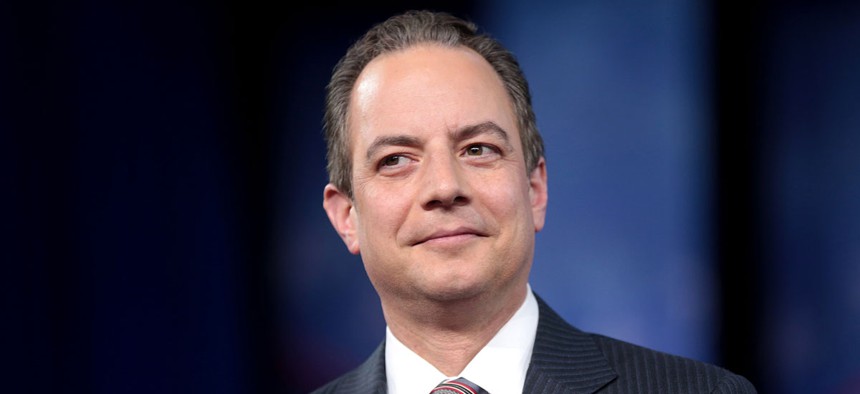
Flickr user Gage Skidmore
Shutdown Crisis Looms for GOP
Republicans control the budget levers, but they may not be able to agree among themselves.
If you could be a fly on the wall eavesdropping on a meeting these days, only one would be more interesting than the brainstorming sessions that Senate Majority Leader Mitch McConnell and House Speaker Paul Ryan are having with their respective leadership teams. It would be the meeting at which White House Chief of Staff Reince Priebus and his legislative-affairs team explain to President Trump the mechanics and consequences of a looming April 29 government shutdown, which would coincidentally fall on Trump’s 100th day in office. The timeline is tight: Congress leaves this Friday for the Easter-Passover recess, the Senate returns on April 24, the House returns on April 25, and the current continuing resolution expires at midnight on April 28.
A shutdown would affect virtually the entire federal government. Last year, only one of the 12 appropriations bills, for veterans and military construction, was funded beyond April 28. In recent years, Congress has become heavily dependent on passing omnibus appropriations bills, with virtually everything tossed into the mix.
Threats of a possible government shutdown occur from time to time. The last one occurred from Sept. 30 to Oct. 17, 2013, during President Obama’s second term. There were none during President George W. Bush’s tenure. President Clinton had two—Nov. 13-19, 1995, and again from Dec. 15, 1995 to Jan. 6, 1996. The single shutdown during George H.W. Bush’s presidency occurred on Oct. 5-9, 1990. There were a whopping eight shutdowns during the Reagan administration. Of course, a government shutdown is not entirely or necessarily the president’s fault; it’s usually the result of at least one chamber of Congress being in the hands of a party different from the president’s.
What would set this one apart is that Republicans hold the White House as well as majorities in the House and Senate. It would be the first same-party shutdown in 37 years. The last occurred when President Carter had five separate periods in which one spending bill expired before another one was adopted, all with Democratic Congresses in place, though in those days only partial shutdowns took place. The main hang-up then was abortion.
So why is a shutdown very possible with Republicans in charge of all three levers in the budget process? Maybe it’s because they are not all members of the same Republican Party. One Republican Party would be adamantly opposed to funding for Planned Parenthood. Another Republican Party is dominated by the Freedom Caucus, whose members are boiling over the potshots they took from Trump after “repeal and replace” failed in the House. A mishmash of Republicans are ambivalent about a proposal to hike defense spending by 10 percent. None of these Republican factions can expect help from Democrats, who oppose the big hike in military outlays, ridicule funding for a border wall, and—under the Senate dome—remain livid over Obama Supreme Court nominee Merrick Garland’s treatment by Republicans and hanker for payback against Trump’s pick, Neil Gorsuch.
This situation has the potential to be a major disaster for Trump and Republicans. They face the possibility of government grinding to a halt, with massive furloughs of government employees that result in deferred payrolls. With an economy that is still pretty fragile and a House majority that is awfully thin, it doesn’t take much of an imagination to see how this becomes a political nightmare.
Some White House operatives naively think they could blame a government shutdown on Democrats. They would probably buy beachfront property in West Virginia, too. Coming on the heels of Republicans being unable to get their act together on a health care bill, the odds of them being able to pin the tail on the Democratic donkey, while Republicans are in charge of the budget machinery, seem highly remote. And it’s hard to imagine the hostile media doing a backflip and helping Trump sell this fiction.
It isn’t clear that Trump fully understands what is going on, and what it means for a president with job-approval ratings below 40 percent and disapprovals in the high 50s even before the budget problem comes into view. If some voters didn’t think he was in over his head before, a lot more would come to that conclusion if the government shuts down. For that matter, the two-thirds of Republican House members and 60 percent of GOP senators who have never served with a Republican president have no experience with the real-word compromises need to push through a budget.
A government shutdown would not be seen by most voters as a policy dispute. It would be perceived as a matter of competence—nothing more, nothing less. The author of The Art of the Deal is going to be tested on whether he can strike a big bargain inside the Beltway.
(Image via Flickr user Gage Skidmore)






